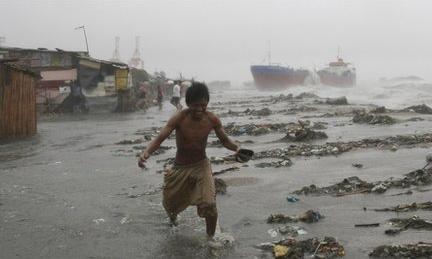 A powerful typhoon has struck the Philippines, triggering floods, cutting power and halting work in the capital Manila.
A powerful typhoon has struck the Philippines, triggering floods, cutting power and halting work in the capital Manila.
Typhoon Nesat also forced the closure of the Philippine Stock Exchange and the US embassy in the city.
At least two people were killed and another four were reported missing.
As the storm approached, the authorities ordered the evacuation of more than 100,000 people in the central Albay province.
The typhoon is expected to continue across the country, before blowing across the South China Sea towards southern China on Thursday.
Fishermen missing
Nesat made landfall just before dawn on Tuesday in the eastern Isabela and Aurora provinces on the Pacific coast.
The storm - with wind gusts of up to 170km/h (105mph) - is now making its way across the island of Luzon, the BBC's Kate McGeown in the central Luzon province of Zambales reports.
Many roads have been flooded and flights cancelled, and local media are urging people against non-essential travel, our correspondent says.
In Manila, government offices, schools and universities were closed, as the authorities urged city residents to stay indoors.
Officials warn that low-lying areas of the capital are particularly vulnerable to flooding and landslides.
There were reports of one landslide just north of Manila and another in central Luzon.
At least two people died, including a baby who fell into a swollen river in the central province of Catanduanes.
Four fishermen are missing, and more than 50 more have been rescued after their boats capsized in rough seas.
There are fears that the death toll would rise further.
Meteorologists also warn that huge - 12ft (4m) - waves are expected to slam the shoreline.
"The damage is expected to be big," Richard Gordon, head of the Philippines National Red Cross, told the BBC.
"Right now there are already power interruptions. Our agriculture will again be damaged here. And certainly in terms of infrastructure there are some bridges that are flooded right now."
Earlier, about 110,000 people in several towns of the Albay province were ordered to leave their homes and seek shelter elsewhere.
"We can't manage typhoons, but we can manage their effects," provincial Governor Joey Salceda was quoted as saying by the Associated Press.
The Philippines suffers frequent typhoons - but Nesat is thought to be the largest this year.
"This typhoon is very wide in diameter, about 650km, and covers most of Luzon," Graciano Yumul, who supervises the country's weather bureau, told reporters.
It comes almost exactly two years after Typhoon Ketsana killed more than 400 people.



